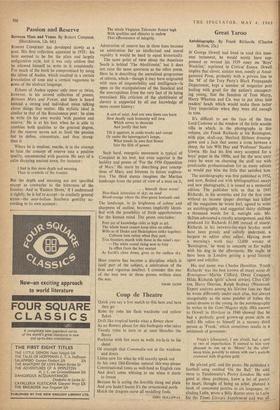Passion and Reserve
Between Mars and Venus. By Robert Conquest. (Hutchinson, 12s. 6d.)
ROBERT CONQUEST has developed slowly as poet. His first collection appeared in 1955: his bent seemed to be for the plain and largely unfigurative style, but it was only seldom that he allowed himself to write in it consistently. For much of the book he compromised by using the idiom of Auden, which resulted in a certain irresolution of tone and a certain vagueness to some of the abstract language.
Echoes of Auden appear only once or twice, however, in his second collection of poems, Between Mars and Venus, and there is heard instead a strong and individual voice talking about things that matter. His stylistic ideal is similar to that of the Renaissance poet: he aims to write (in his own words) 'with passion and reserve.' He is at his best when he is able to combine both qualities to the greatest degree, for the reserve serves not to limit the passion but to define, concentrate, and thus streng- then it.
Where he is weakest, maybe, is in the attempt to turn the concept of reserve into a positive quality, unconnected with passion. He says of a calm decaying ancient town, for instance:
I find in this more depth and meaning Than in symbols of the frontier.
But the depth and meaning are not specified except as contraries to the bitterness of the frontier. And in 'Eastern Shote,' if I understand it rightly, he is led to accept—in similarly general terms—the ante-bellum Southern gentility ac- cording to its own account : The whole Virginian Tidewater flamed high With qualities and climates to endow That efflorescence of integrity.
Admiration of reserve has in these lines become an admiration for an intellectual and moral vapidity it would be hard to equal historically.
The same point of view about the American South is behind 'The Abolitionist,' but it does not raise the same questions as the other poem. Here he is describing the unrealised programme of reform, which—though it may have originated with men of responsibility and intelligence—is open to the manipulations of the fanatical and the unscrupulous from the very fact of its being unrealised. His criticism of the abolitionist of slavery is supported by all our knowledge of more recent history:
A sort of saint. And our own times can learn How deadly such humanity will turn Which serves to decorate
And justify that hate Till it approve, in cattle-trucks and camps Or under the interrogator's lamps, What treads its own first flower Into the filth of power.
Such hard, energetic movement is typical of Conquest at his best, but even superior is the lucidity and power of 'For the 1956 Opposition of. Mars.' He starts by describing past concep- tions of Mars, and foresees its future explora- tion. The third stanza imagines the Martian landscape from the point of view of a man on it, . . . beneath those noons'
Blue-black intensities of sky; on sand Blood-orange where the blue-green lowlands end.
The landscape, in its brightness of colour and sharpness of outline, becomes implicitly identi- fied with the possibility of fresh apprehensions for the human mind. The poem concludes:
Pure joy of knowledge rides as high as art. The whole heart cannot keep alive on either. Wills as of Drake and Shakespeare strike together;
Cultures turn rotten when they part.
True frontiers march with those in the mind's eye: —The white sound rising now to fury In efflux from the hot venturi
As Earth's close down, gives us the endless sky.
Here reserve has become a discipline which is itself part of the subject, a celebration of the firm and vigorous intellect. I consider this one of the best two or three poems written since the war.
THOM GUNN






































 Previous page
Previous page